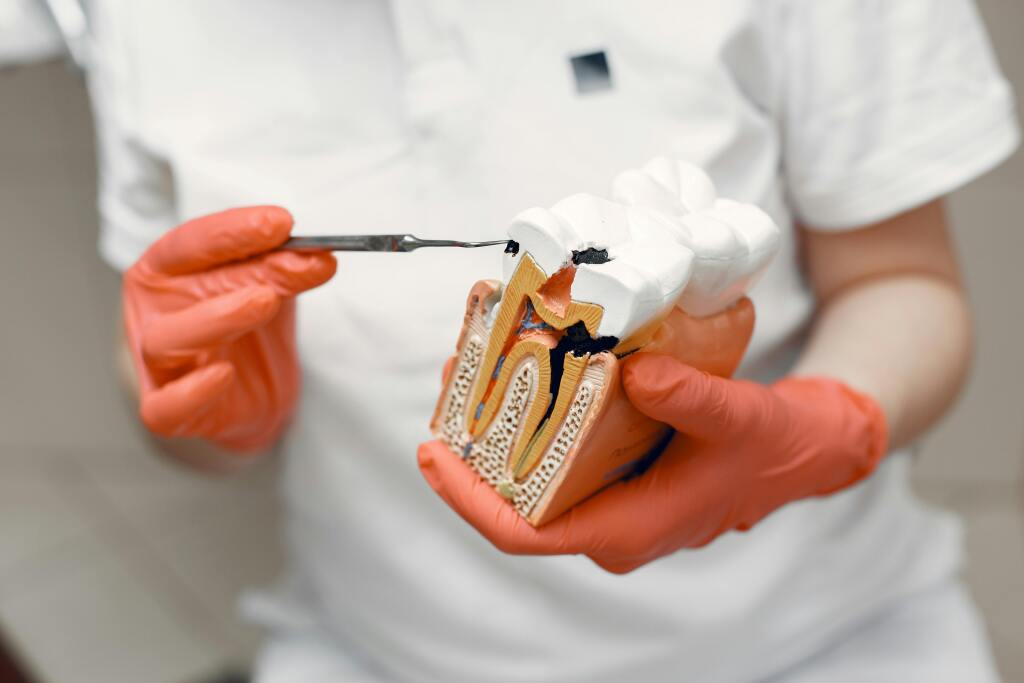Tooth decay is one of the most common health issues worldwide.
While brushing, flossing, and regular dental visits are the gold standard for prevention, many people turn to natural remedies in hopes of reversing cavities or improving oral health.
But are these remedies actually effective, or are they just wishful thinking?
Let’s explore the science-backed truths behind natural remedies for tooth decay and separate the myths from the facts.
🦷 What Is Tooth Decay?
Tooth decay (also known as dental caries or cavities) occurs when plaque bacteria produce acids that wear away the enamel, the protective outer layer of your teeth.
If left untreated, decay can:
- Penetrate deeper into the tooth
- Cause pain and sensitivity
- Lead to infection or tooth loss
🌱 Can Tooth Decay Be Reversed Naturally?
Enamel cannot regenerate, but early-stage tooth decay (demineralization) can sometimes be halted or partially reversed through remineralization.
This is where some natural remedies may help, but only if the cavity hasn’t progressed too far.
✅ Natural Remedies That May Help Prevent or Slow Tooth Decay
1. Oil Pulling
Swishing coconut or sesame oil in the mouth for 10–20 minutes daily.
Truth:
Oil pulling may reduce harmful bacteria like Streptococcus mutans and improve gum health, but it cannot reverse established cavities.
✅ Best as a supplementary practice, not a replacement for brushing.
2. Remineralizing Toothpaste
Toothpaste with calcium, phosphate, and hydroxyapatite can help strengthen enamel.
Truth:
Some natural remineralizing pastes (especially those with nano-hydroxyapatite) are scientifically supported and may slow or stop early-stage decay.
✅ Choose fluoride or hydroxyapatite-based formulas for real results.
3. Xylitol
A natural sweetener that reduces cavity-causing bacteria and increases saliva flow.
Truth:
Multiple studies support xylitol’s role in preventing decay. Found in gums, mints, and toothpaste.
✅ Use xylitol products 3–5 times a day for best effect.
4. Green Tea
Rich in polyphenols and fluoride, it reduces bacterial growth and acid production.
Truth:
Green tea has antibacterial and anti-inflammatory benefits for oral health.
✅ Drink it unsweetened, and rinse with water afterward to prevent staining.
5. A Healthy, Whole-Foods Diet
Diets low in sugar and processed foods and high in vitamins A, D, K2, and calcium support stronger enamel.
Truth:
Your diet is one of the most powerful tools for protecting teeth and preventing demineralization.
✅ Focus on leafy greens, fish, eggs, fermented foods, and dairy.
❌ Natural Remedies That Don’t Work (and May Harm)
1. Lemon Juice or Apple Cider Vinegar
Sometimes recommended for “detoxing” or whitening.
🚫 Truth: These are highly acidic and erode enamel, accelerating decay.
2. Activated Charcoal
Popular in DIY toothpaste and whitening powders.
🚫 Truth: Highly abrasive and can wear down enamel over time, especially with frequent use.
3. DIY Baking Soda Paste
Used for stain removal or alkalizing the mouth.
🚫 Truth: Occasional use is okay, but too abrasive for daily brushing. Doesn’t treat decay.
🧪 Can You Heal a Cavity Naturally?
✅ Early-stage decay (white spots) can sometimes be remineralized with fluoride, diet, and improved hygiene.
❌ Once a cavity forms, you need a dentist. No oil, paste, or supplement can rebuild lost enamel or fill holes.
🛡️ Best Practices to Prevent Tooth Decay (Naturally and Scientifically)
- Brush twice daily with fluoride or hydroxyapatite toothpaste 🪥
- Floss daily to remove plaque and food between teeth 🧵
- Use xylitol mints or gum throughout the day 🍬
- Eat a nutrient-rich, low-sugar diet 🥦
- Drink plenty of water 💧
- Visit your dentist for cleanings and early detection 🦷
🤔 FAQs About Natural Remedies for Tooth Decay
1. Can cavities go away on their own?
No. Early demineralization may reverse with good care, but actual cavities require treatment.
2. Is fluoride natural?
Yes, fluoride is a naturally occurring mineral that strengthens enamel. It’s proven to prevent cavities.
3. Are herbal mouthwashes effective?
Some, like clove or tea tree oil-based rinses, may reduce bacteria, but they should not replace brushing or dental visits.
4. What is the best natural remedy to support enamel health?
A combination of a whole-food diet, xylitol, green tea, and a remineralizing toothpaste.
5. How can I tell if I have a cavity?
Symptoms include tooth sensitivity, pain, discoloration, or visible holes. Only a dentist can diagnose accurately.
🧠 Final Thoughts
Natural remedies can play a supportive role in your oral care routine, especially for prevention and early intervention.
However, they are not substitutes for professional dental care or proven treatments.
If you suspect you have tooth decay, the best thing you can do is:
- Improve your hygiene and diet
- Use natural supplements with proven benefits
- And most importantly, see a dentist for proper diagnosis and treatment
Your smile is worth the science 🧪 and the care 🦷.
















